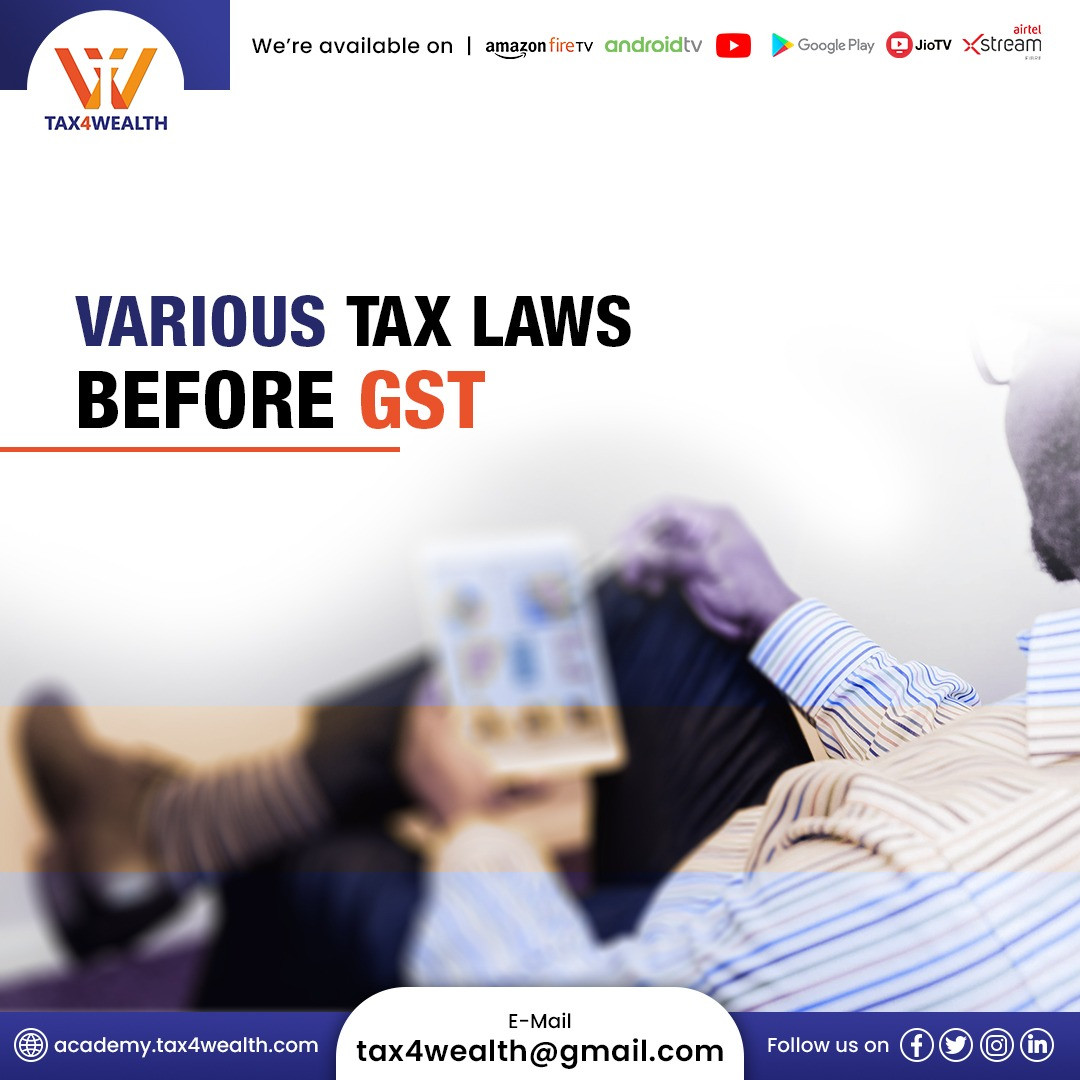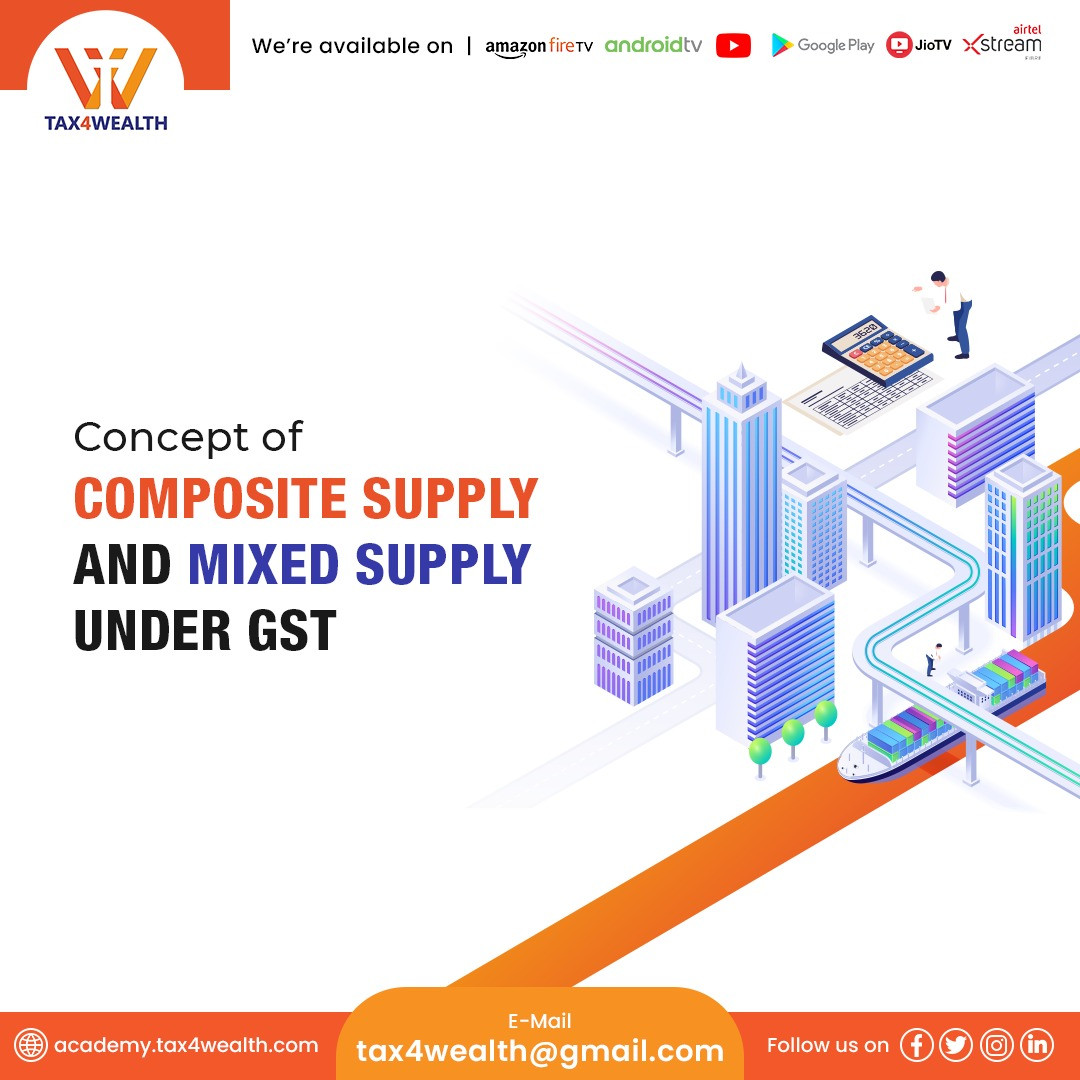
Various Tax Laws Before GST
Taxation: An Introduction:-
Taxation is one of the instruments that are being used to achieve the economic development and long-term growth of a country. It is obvious to understand the fact that the component of the tax must be targeted towards the development and achievement of economic growth. Generally, income tax has quite a little impact or says no impact on the business income growth and effective impact on the economic growth of a country. With regard to achieving long-term economic development and growth, it is important to know about the different sources of income.
Apart from that, it is also important to understand and analyze the fact that which tax components are actually relevant to achieve economic growth.
The Indian taxation system has gone through multiple reforms in the past few decades. With an objective of forming a better compliance system, easy payment of tax, and greater enforcement, the rates of taxes are streamlined and accordingly, tax laws have been simplified over a period of time. It is an ongoing process considering the effect of the rationalization of the tax administration. Accordingly, the Indian taxation system has been divided into two types which are as follows;
• Direct Taxes
• Indirect Taxes
Types of Direct Taxes:-
The following are some of the types of direct taxes currently operating in the Indian taxation system;
Income Tax:-
Under the provisions of the Income Tax Act of 1961, a person who is a beneficiary exceeds his total income in a financial year to a maximum exemption limit is liable to income tax at a specified rate as prescribed by the Finance Act in that specified assessment year. A taxpayer is also known as an assessee may be an individual, association, group, company, local authority, Hindu Undivided Family, or a firm. The residential status of a person determines the total income of a taxpayer in a particular financial year. With regard to tax, an individual taxpayer can be a resident, non-resident, or not ordinary resident.
Wealth Tax:-
Wealth tax is a tax that is charged on the asset or inventory of a company. The term "Wealth" includes cash, real estate, assets, bank deposits, ownership in companies, personal funds or trusts, stocks, bonds, etc.
Types of Indirect Taxes:-
Sales Tax:-
Sales tax is a tax that was levied in the sale of goods. It was payable by the seller as part of the trade irrespective of the fact of whether it is an interstate or intra-state transfer of goods or importing or exporting of goods from India.
Value-Added Tax (VAT):-
Value-Added Tax is considered as a multi-level tax system imposed on the goods as the tax was being imposed through different delivery levels and production with credit taxes paid already at each stage of the creation of value.
The introduction of Value-added Tax was also considered as a primary tax reform at the state level. With time, a steady increase in the value-added tax rate was noticed. The ten existing rates replaced the value-added tax rate at the state level. These days, all the taxes of the government with regard to buying or selling of goods have been subsumed in the form of GST.
Excise Tax:-
The excise tax was imposed on the goods that are made in India.
Customs Duty:-
Customs Duty otherwise known as Import Duty was imposed by the Central Government of India on the goods manufactured in India. In simple words, it was imposed on the goods of India. The rate of duty was applicable depending on the classification goods and accordingly, the custom tariffs were determined.
Service Tax:-
In India, the service tax was introduced in the year 1994. At that time, it had introduced only 3 services such as general insurance, telephone, and stock brokerage. With the passage of time, all of the services fell under the scope of service tax except for the services which were mentioned on the negative list. With time, a steady increase in the service tax rate was noticed.
Pre GST Tax Regime:-
In the previous indirect tax regime, as mentioned above there were many taxes levied on both states as well as central government. At that time, states collected taxes mainly in the form of VAT i.e. value-added tax and it is to be noted that each state had a separate set of rules and regulations for the collection of taxes.
The central government was collecting taxes on inter-state sale of goods which was known as Central State Tax. It was applicable in the case of inter-state sale of goods. Some of the other indirect taxes such as local taxes, octroi, entertainment taxes were also being imposed by both state and center jointly. This ultimately led to a lot of tax overlapping, imposed by both centers as well as the state.
For example, in case the goods were manufactured and sold, the center was charging excise duty. Apart from excise duty, VAT was also being charged by the state. It ultimately led to a tax on tax impact also known as the cascading effect of taxes.
Some of the other indirect taxes in the pre-GST regime are mentioned below:-
• Central Sales Tax
• Purchase Tax
• Luxury Tax
• Entertainment Tax
• Entry Tax
• Taxes on advertisements
• Central Excise Duty
• Duties of Excise
• Special Additional Duty of Customs
• Cess
• State Value-Added Tax
• Taxes on Lotteries, Betting, and Gambling
• Additional Duties of Excise
• Additional Duties of Customs
After the implementation of GST, CGST, SGST, and IGST replaced all the above-mentioned indirect taxes. However, some of the taxes including GST imposed on the inter-state purchase at the rate of 2% which is a concessional rate with the issuance of Form C are still effective.
It is applicable to some non-GST goods which include the following:-
• Petroleum Crude
• High-speed Diesel
• Petrol
• Natural Gas
• Aviation Turbine Fuel
• Alcoholic Liquor (meant for human consumption)
It is applicable to the below-mentioned transactions only;
• Usage for Manufacturing or Processing
• Resale
• Usage in some sectors including mining, telecommunication, electricity generation, and distribution or any other power sector.
For more information, Visit us at: https://academy.tax4wealth.com/
Related News
No comments yet, Be the first to comment.













